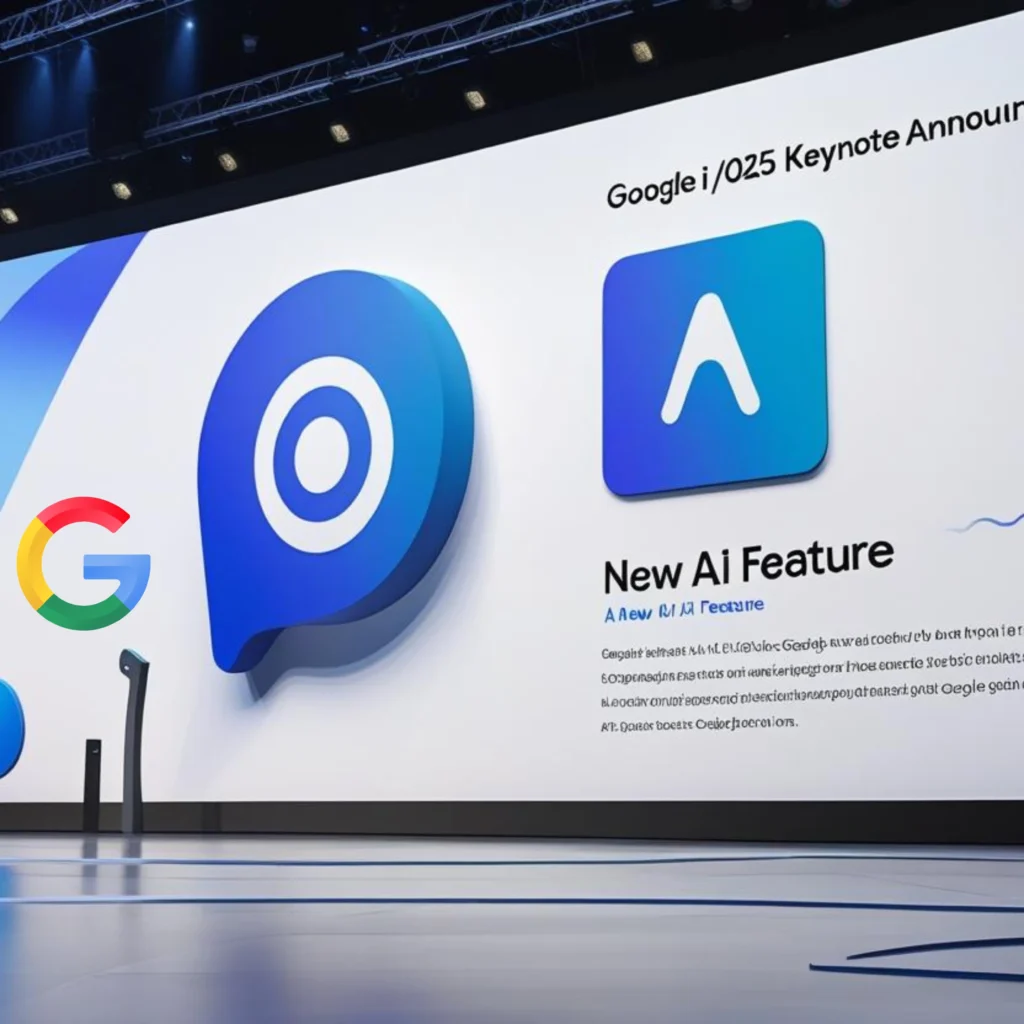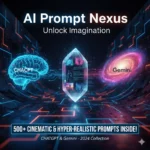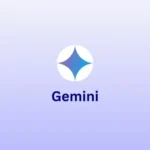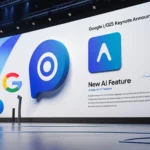The Dawn of a New Era: Navigating Google’s Latest AI Features and What They Mean for Your Online World
The internet, as we know it, is undergoing a monumental transformation, and at the heart of this revolution is Google’s relentless pursuit of Artificial Intelligence. Gone are the days of simple ten-blue-link search results; we are now stepping into an intelligent, conversational, and deeply personalized online experience. Google’s recent announcements, particularly those stemming from I/O 2025, signal not just an evolution, but a fundamental reimagining of how we interact with information, create content, and conduct business online. This isn’t just about faster answers; it’s about a symbiotic relationship between humans and AI, pushing the boundaries of what’s possible.
In this comprehensive exploration, we will delve into the most significant of Google’s new AI features, dissecting their implications for users, content creators, and the very fabric of the digital landscape. Prepare to understand the shifts, adapt your strategies, and thrive in this exciting new chapter.
I. The Core of the Revolution: Gemini and the Reimagined Search Experience
At the epicenter of Google’s AI advancements is Gemini, their most capable and versatile AI model. Gemini 2.5, in particular, is now being deeply integrated across Google’s ecosystem, fundamentally reshaping the search experience.
A. AI Mode: A Conversational Gateway to Information
The most impactful change to Search is the widespread rollout of AI Mode. This isn’t merely an addition; it’s a paradigm shift. Instead of just presenting a list of links, AI Mode leverages Gemini to provide comprehensive, AI-generated responses to your queries, often without the need to click through to external websites.
- How it Works: When you ask a question in AI Mode, Google’s AI performs a “query fan-out” technique. It breaks down your complex query into multiple sub-questions, conducts numerous related searches across diverse data sources, and then synthesizes all that information into a coherent, summarized answer. This process is remarkably fast, aiming to deliver “the quickest AI answers in the world.”
- Beyond Simple Summaries: AI Mode goes further than just summarizing existing content. It’s designed for more nuanced questions, offering in-depth explanations, complex comparisons, and even reasoning. Imagine asking, “What are the pros and cons of solar panels for a small urban apartment, considering limited roof space and intermittent sunlight?” AI Mode can now generate a detailed, reasoned response drawing from various sources, providing a jumping-off point for further exploration.
- Deep Search: For truly complex queries requiring extensive research, Google is introducing “Deep Search” within AI Mode (currently in Labs). This feature can analyze hundreds of sources, applying advanced AI reasoning to generate comprehensive reports in minutes. This is a game-changer for researchers, students, and anyone needing to quickly grasp a vast amount of information.
- Multimodal Interaction with Search Live: The future of search is increasingly multimodal. Project Astra’s “Search Live” capabilities are coming to AI Mode (expected this summer), allowing you to interact with Search using your camera and voice in real-time. Picture holding up a broken appliance and asking Google what parts you need, or pointing your camera at a plant and asking for identification and care instructions. This blurs the lines between visual information and text-based search, making knowledge acquisition more intuitive and immediate.
- Agentic Capabilities: Google is also bringing “agentic capabilities” from Project Mariner to AI Mode in Labs. This means Search will soon be able to perform tasks on your behalf, starting with things like finding event tickets, making restaurant reservations, and booking local appointments. This moves Google from a mere information provider to an active assistant in your daily life.
- Data Analysis and Visualization: For queries involving complex datasets, particularly in areas like sports and finance, AI Mode will be able to analyze the data and generate custom graphics to bring it to life. This democratizes data analysis, making it accessible to a wider audience.
- AI Mode Shopping Experience: The shopping experience is being revolutionized with AI Mode. You’ll be able to have conversational interactions to browse for inspiration, think through considerations, and find the right products. Furthermore, Google is rolling out virtual try-on for billions of apparel listings, allowing you to upload a photo of yourself and see how clothes look on you. Agentic checkout features will also help you track prices and make purchases at your desired budget.
B. AI Overviews: Enhancing Existing Search Results
While AI Mode is a new tab, AI Overviews continue to evolve within the traditional search results page. These AI-generated summaries appear at the top of the SERP for certain queries, providing a quick synopsis of the answer.
- Widespread Adoption: AI Overviews have scaled significantly since their introduction, now reaching 1.5 billion monthly users in 200 countries and territories. This makes Google Search’s generative AI the most widely used product of its kind globally.
- Increased Engagement: Google reports that in major markets like the U.S. and India, AI Overviews are driving over a 10% increase in usage for the types of queries where they appear. They also claim clicks from AI Overviews are “higher quality,” with users spending more time on the destination sites.
- Impact on SEO: This is a crucial point for website owners. While Google states AI Overviews lead to higher quality clicks, studies from third-party analytics firms like Ahrefs and SimilarWeb have shown a potential decrease in overall organic click-through rates (CTR) for top-ranking pages. This highlights the need for content creators to adapt their SEO strategies.
II. Implications for Content Creators and Digital Marketing
The shift towards AI-powered search has profound implications for how content is created, optimized, and consumed.
A. The New SEO Imperative: Beyond Keywords
Traditional SEO focused heavily on keywords and ranking within the “ten blue links.” While these remain important, the AI era introduces new layers of complexity and opportunity.
- Focus on Unique, Valuable, and Authoritative Content: AI Mode and AI Overviews prioritize content that is not just well-written, but also deeply informative, original, and authoritative. The AI is designed to discern semantic clarity, depth, and expertise. This means less emphasis on keyword stuffing and more on genuinely helpful, comprehensive content that answers user intent thoroughly.
- Structured Content for AI Comprehension: AI thrives on structured data. Using clear headings (H2, H3) that are descriptive and intent-oriented, creating well-defined blocks with introductions, developments, and conclusions, and incorporating lists with explanations will make your content more “AI-readable.”
- Multimodal Content is King: As Google’s AI becomes increasingly multimodal, so too should your content strategy. High-quality images, videos, audio, and interactive elements will become more crucial for attracting AI attention and user engagement. Think beyond text; how can your content be consumed in various formats?
- Building Thematic Authority with Pillar Pages and Content Clusters: Google’s AI aims to understand your website’s overall thematic authority. Developing robust content clusters around specific topics, with well-structured pillar pages, will help the AI interpret your content more effectively, increase user retention, and position your site as a trusted source.
- Real-time Relevance and Content Updates: Google’s AI prioritizes updated information. Regularly reviewing and refreshing old content – adjusting headings, updating statistics, restructuring layouts, and adding internal links – is no longer optional but essential for maintaining visibility.
- Trust and E-E-A-T (Experience, Expertise, Authoritativeness, Trustworthiness): The emphasis on trust is paramount. Google’s AI will rely on the knowledge graph and real-world sentiment (reviews, press, social signals) to determine if your brand is trustworthy. This means a comprehensive, current, and well-managed online presence, with strong positive sentiment, directly influences whether your brand is cited as an authority by the AI.
- The “Zero-Click” Phenomenon and its Nuances: The concern about “zero-click searches” (where users get their answer directly from the AI overview without clicking through) is valid. However, Google argues that these AI overviews can also provide more context and display a wider range of supporting links, potentially leading to more engaged users who are then more likely to convert. The shift isn’t just about clicks; it’s about the quality and intent behind those clicks. Content creators need to measure conversion metrics beyond just traffic.
- Anticipating AI Agents: The eventual rise of AI agents performing tasks on behalf of users means websites need to be structured and optimized for AI readability. If an AI agent is booking an appointment or making a purchase, your site’s infrastructure must be designed for frictionless automated interactions.
B. Google Ads in the AI Era
Google’s advertising ecosystem is also undergoing a significant AI-driven transformation.
- Ads in AI Overviews: Google is expanding the display of ads directly within AI-powered responses, accelerating the path from discovery to decision. This offers new opportunities for advertisers to reach users at critical moments of information consumption.
- Power Pack and AI-Powered Campaigns: Google is introducing “Power Pack,” a new generation of AI-powered campaign solutions built for this multi-modal, AI-driven search era. This includes enhancements to Performance Max, AI Max for Search campaigns, and Demand Gen, all leveraging Google AI to optimize ad performance.
- Asset Studio and AI-Generated Creatives: Advertisers will have access to “Asset Studio,” a centralized destination for creating high-quality creative assets and variations with Google AI. This includes image-to-video capabilities with Veo and Imagen, enabling easy generation of lifestyle imagery featuring products.
- Predictive Actionable Insights in Merchant Center: Merchant Center will leverage AI to identify opportunities and generate content suggestions, discount recommendations, and more, empowering businesses with AI-driven insights for their product listings.
III. AI Beyond Search: Productivity, Creativity, and Ethical Considerations
Google’s AI ambitions extend far beyond search, permeating various aspects of our digital lives.
A. Enhanced Productivity with Gemini in Workspace
Gemini is deeply integrated into Google Workspace apps, transforming how we work and collaborate.
- Smart Drafting and Summarization: Gemini can now draft emails, reply to messages, and summarize lengthy documents or email threads, saving significant time.
- Creative Assistance: Gemini acts as a creative assistant in presentations, generating images and designs on the fly.
- Meeting Notes and Research: Gemini can take meeting notes, allowing participants to focus on the conversation. It also functions as a research analyst, spotting trends, synthesizing information, and identifying business opportunities.
- New Tools like Google Vids: Google Vids, an AI-powered video creator and editor within Workspace, allows users to generate professional-looking videos from prompts, with suggested scenes, stock media, and editable outlines. This democratizes video creation for business communication.
- NotebookLM for Accelerated Knowledge Sharing: NotebookLM, an out-of-the-box agent in Google Agentspace, helps users surface insights faster by uploading sources and generating instant insights, even creating podcast-like Audio Overviews.
B. Powering Creativity with Advanced AI Models
Google is pushing the boundaries of generative AI for creative endeavors.
- Imagen 3: This advanced image generation model creates incredibly realistic and detailed visuals from text descriptions, with applications ranging from marketing to design.
- Veo and Lyria RealTime: Veo focuses on high-quality video generation, while Lyria RealTime enables interactive music generation, offering new possibilities for creators in various fields.
- Native Audio and Text-to-Speech (TTS): Gemini 2.5 Flash now supports native audio dialog in the Live API, generating natural responses with over 30 voices and proactively distinguishing speakers from background conversations. New TTS capabilities are also being rolled out.
C. The Ethical Compass: Responsible AI Development
As AI capabilities grow, Google emphasizes its commitment to responsible AI development.
- AI Principles: Google’s AI principles, established in 2018, guide their development and deployment, focusing on fairness, privacy, transparency, and safety.
- Combating Bias: Efforts are in place to prevent and mitigate bias in AI models by ensuring training data accurately reflects user populations, identifying underrepresented groups, and avoiding sensitive features that could perpetuate bias.
- Privacy by Design: Incorporating privacy principles from the outset, including removing personally identifiable information (PII) from datasets and securing data repositories, is crucial.
- Transparency and Accountability: Tools like Model Cards provide templates to document models and enhance transparency, making it easier to understand how AI systems function.
- Safety and Adversarial Testing: Models are designed to operate safely in adversarial conditions, with rigorous testing to identify and address potential failure points and hostile inputs.
- Watermarking and Red Teaming: Google is enhancing data watermarking technologies and expanding red teaming practices to improve the safety and security of AI systems, especially in generative AI.
IV. The Future is Now: Preparing for an AI-First World
Google’s recent announcements are not merely incremental updates; they represent a fundamental shift towards an AI-first internet. This has profound implications for individuals, businesses, and society at large.
A. Adapting to the AI-Driven Search Landscape
For website owners and digital marketers, adaptation is not optional.
- Deepen Your Content: Focus on creating genuinely helpful, comprehensive, and unique content that addresses user intent in depth. Think of your website as a knowledge hub, not just a collection of keywords.
- Embrace Multimodality: Integrate images, videos, and interactive elements into your content strategy. How can your information be conveyed beyond just text?
- Optimize for AI Comprehension: Structure your content clearly, use semantic markup where appropriate, and ensure your site is technically sound for easy crawling and indexing by Google’s AI.
- Build Authority and Trust: Cultivate a strong online presence, garner positive reviews, and ensure your brand is perceived as an authoritative and trustworthy source of information.
- Monitor and Analyze Beyond Clicks: While traffic remains important, pay close attention to engagement metrics, conversions, and the overall value of visits from AI-powered search results.
B. The Evolving Role of Content Creators
Content creators are not being replaced by AI; their roles are evolving. AI becomes a powerful co-pilot, automating mundane tasks and augmenting creative capabilities.
- Focus on Strategy and Creativity: AI can handle repetitive tasks like drafting, summarization, and initial content generation. This frees up human creators to focus on higher-level strategy, creative ideation, and injecting unique human insights and perspectives.
- Become AI Prompt Engineers: Learning to effectively “prompt” AI models to generate desired outputs will be a critical skill. Understanding how to refine prompts, provide context, and guide the AI will be essential.
- Curate and Refine AI-Generated Content: While AI can generate content, human oversight is crucial for accuracy, nuance, and maintaining brand voice. Content creators will become expert curators and refiners of AI-generated drafts.
- Embrace New Formats and Modalities: The rise of multimodal AI means content creators need to be comfortable experimenting with new formats, from AI-generated video and audio to interactive experiences.
C. The Broader Societal Impact
The widespread integration of AI raises important questions and considerations for society.
- Job Market Transformation: As Google DeepMind CEO Demis Hassabis warns, AI will disrupt jobs. However, it will also create new, often more valuable and interesting, roles. The key is to embrace continuous learning and develop skills that complement AI capabilities.
- Information Consumption Habits: The way we consume information is changing, with a greater reliance on summarized, AI-generated answers. This necessitates media literacy and critical thinking to evaluate sources and understand potential biases.
- Digital Divide: Ensuring equitable access to AI tools and education will be crucial to prevent exacerbating existing digital divides.
- Ethical Governance: Ongoing dialogue and robust frameworks for AI governance will be essential to ensure AI is developed and deployed responsibly, upholding human values and safeguarding against potential harms.
Conclusion: A Future of Infinite Possibilities
Google’s latest AI features herald a new dawn for the internet. The transition to an AI-first world is not without its challenges, but it also presents an unprecedented array of opportunities. For businesses, it means a deeper understanding of user intent and new avenues for engagement. For content creators, it offers powerful tools to augment creativity and reach wider audiences. For users, it promises a more intuitive, intelligent, and personalized online experience.
Embracing these advancements, understanding their implications, and proactively adapting will be key to thriving in this exciting new era. The future of the internet is not just about finding information; it’s about engaging with intelligence, and Google is leading the charge. The journey has just begun, and the possibilities are truly limitless.
You can read our more Blogs




